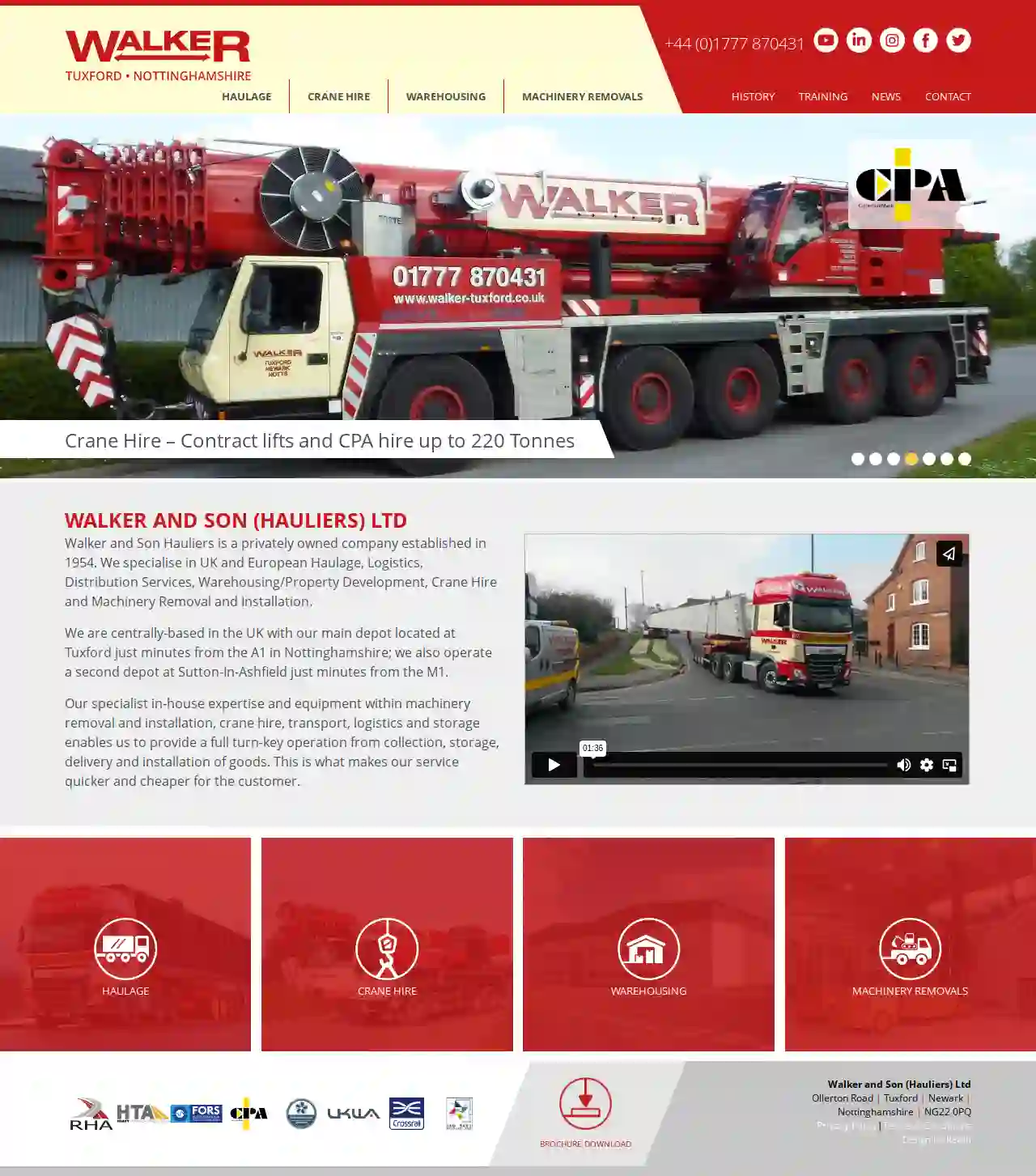Excavation Contractors Mansfield
Top Excavation Contractor in Mansfield
Receive 3 FREE Excavation Contractor quotes for your project today! Compare profiles, reviews, accreditations, portfolio, etc... and choose the best service.

Walker & Son (Hauliers) Ltd
4.68 reviewsOllerton Road, Tuxford, NG22 0PQ, GBWalker and Son (Hauliers) Ltd Walker and Son Hauliers is a privately owned company established in 1954. We specialize in UK and European Haulage, Logistics, Distribution Services, Warehousing/Property Development, Crane Hire and Machinery Removal and Installation. We are centrally-based in the UK with our main depot located at Tuxford just minutes from the A1 in Nottinghamshire; we also operate a second depot at Sutton-In-Ashfield just minutes from the M1. Our specialist in-house expertise and equipment within machinery removal and installation, crane hire, transport, logistics and storage enables us to provide a full turn-key operation from collection, storage, delivery and installation of goods. This is what makes our service quicker and cheaper for the customer. Haulage Crane Hire Warehousing Machinery Removals
- Services
- Why Us?
- Gallery
Get Quote
E P Industries Ltd
3.29 reviewsPye Bridge Ind Est, Main Road, Pye Bridge Ind Est | Main Road | Pye Bridge, Alfreton, DE55 4NX, GBEP Industries: Your Trusted Partner for Rail & Construction Plant EP Industries is a leading provider of services and products to the rail, construction, recycling, and mining industries. Established in 1988 by Eddie Pilsworth, we've built a strong reputation for quality workmanship, personalized service, and quick response times. Our dedicated team has years of experience maintaining mobile plant, from single machines to large fleet operations, ensuring we can meet your needs, both nationally and internationally. Our expertise extends beyond traditional services. We've gained valuable experience operating mobile equipment in open pit, coal mining, quarrying, and other extractive industries, allowing us to offer a unique perspective and tailored solutions to mobile plant users. At EP Industries, we prioritize building long-term relationships with our customers, ensuring our services are always aligned with your specific requirements.
- Services
- Why Us?
- Gallery
Get Quote- As
Ashfield Tarmacadam
3.17 reviewsMansfield, GB- Services
- Why Us?
Get Quote - As
Ashfield Groundworks Ltd
1Mansfield, GB- Services
- Why Us?
Get Quote - Ea
Eagle Eye Excavating & Construction, LLC
51 reviewsMansfield, GB- Services
- Why Us?
Get Quote 
Dean O'Neill Grab and JCB Hire - Nottingham & Mansfield
53 reviewsMansfield, GBAbout Us My company name is Dean O’Neil Grab and JCB Hire Ltd. I cover Nottingham, Derby and Leicestershire areas to provide the best possible service to my customers and clients. My business is operated to serve both residential and commercial contracts in the above mentioned East Midlands. Dean O’Neill Started working with his Dad many years ago when he was just 14. He worked his way up his fathers company by working in land scaping, fencing and patio and paving. Working hard and learning the ropes for the next 10 years Dean had learded all the main aspects of his Dads company. In this time Dean had moved on to pricing and quoting as well as completing the work as his Dad slowed down a little. Dean decided to widen his skills and went down the academic route at Basford Hall College to qualify in Brick laying and plastering to NVQ level 3. Moving on he trained further and now works as a qualified JCB driver with his CITB licence. He also oporates a 360egree machine above 5 tonne. Dean and his family have working links to Nottingham for over 80 years through Mapperley Landscapes and O’Neill tippers.
- Services
- Why Us?
- Our Team
- Gallery
Get Quote- ST
STS LLC & Excavation
51 reviewsMansfield, GB- Services
- Why Us?
Get Quote 
GEMTREE CONSTRUCTION
11 reviewsMansfield, GB- Services
- Why Us?
Get Quote- As
Ashfield Effluent Services
4.511 reviewsMansfield, GB- Services
- Why Us?
Get Quote - Sc
Scureman Excavating
52 reviewsMansfield, GB- Services
- Why Us?
Get Quote
Over 11,537+ Excavation Contractors in our network
Our excavation companies operate in Mansfield & beyond!
ExcavationHQ has curated and vetted the Best Excavation Contractors in Mansfield. Find a top & trustworthy contractor today.
Frequently Asked Questions About Excavation Contractors
- Project Size and Scope: Larger, more complex excavations naturally take longer.
- Soil Conditions: Rocky or challenging soil types can slow down progress.
- Site Accessibility: Limited access might require more time for maneuvering equipment and hauling materials.
- Weather: Inclement weather can cause delays.
- Permitting and Inspections: Waiting for permits or inspections can extend the timeline.
- Clearly Define the Scope: Outline the project's goals, including the excavation area, depth, grade, and intended use.
- Obtain Necessary Permits: Research and acquire any required permits from your local authorities.
- Mark Utility Lines: Contact your utility companies to locate and mark underground utilities to prevent damage.
- Communicate with Neighbors: Inform your neighbors about the project's timeline and potential noise or disruptions.
- Prepare the Site: Clear any obstacles, such as vegetation, furniture, or structures, from the excavation area.
- Discuss Safety Protocols: Review safety procedures with the contractor to ensure a safe work environment.
How long does an excavation project take?
What is the difference between cut and fill excavation?
Cut: Involves excavating soil from an area where the existing grade is higher than the desired grade.
Fill: Refers to using the excavated soil ('cut' material) to raise the grade in an area where the existing grade is lower than desired.
This method minimizes the need to import or export soil, reducing costs and environmental impact. It's commonly used for site preparation, road construction, and landscaping.
What should I do before excavation starts?
What is the difference between topsoil and subsoil?
Topsoil: The uppermost layer, typically rich in organic matter, nutrients, and microorganisms. It's essential for plant growth and is often darker in color.
Subsoil: The layer beneath the topsoil, containing less organic matter and generally denser. It provides support for roots but is less fertile than topsoil.
During excavation, topsoil is often removed and preserved separately for later use in landscaping, while subsoil is typically used for backfilling or other less demanding applications.
How long does an excavation project take?
- Project Size and Scope: Larger, more complex excavations naturally take longer.
- Soil Conditions: Rocky or challenging soil types can slow down progress.
- Site Accessibility: Limited access might require more time for maneuvering equipment and hauling materials.
- Weather: Inclement weather can cause delays.
- Permitting and Inspections: Waiting for permits or inspections can extend the timeline.
What is the difference between cut and fill excavation?
Cut: Involves excavating soil from an area where the existing grade is higher than the desired grade.
Fill: Refers to using the excavated soil ('cut' material) to raise the grade in an area where the existing grade is lower than desired.
This method minimizes the need to import or export soil, reducing costs and environmental impact. It's commonly used for site preparation, road construction, and landscaping.
What should I do before excavation starts?
- Clearly Define the Scope: Outline the project's goals, including the excavation area, depth, grade, and intended use.
- Obtain Necessary Permits: Research and acquire any required permits from your local authorities.
- Mark Utility Lines: Contact your utility companies to locate and mark underground utilities to prevent damage.
- Communicate with Neighbors: Inform your neighbors about the project's timeline and potential noise or disruptions.
- Prepare the Site: Clear any obstacles, such as vegetation, furniture, or structures, from the excavation area.
- Discuss Safety Protocols: Review safety procedures with the contractor to ensure a safe work environment.
What is the difference between topsoil and subsoil?
Topsoil: The uppermost layer, typically rich in organic matter, nutrients, and microorganisms. It's essential for plant growth and is often darker in color.
Subsoil: The layer beneath the topsoil, containing less organic matter and generally denser. It provides support for roots but is less fertile than topsoil.
During excavation, topsoil is often removed and preserved separately for later use in landscaping, while subsoil is typically used for backfilling or other less demanding applications.